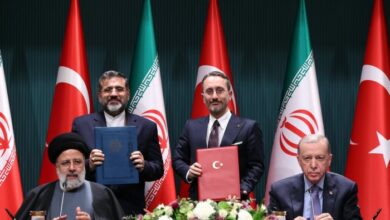
Terror and Just Response: A Complex Dilemma
Terror and just response – these two concepts are inextricably intertwined, forming a complex and often controversial debate. The very nature of terrorism, with its deliberate targeting of innocent civilians and its aim to instill fear and chaos, poses a profound challenge to the principles of justice and the rule of law.
How do we respond to such acts of violence in a way that upholds our values while effectively protecting our societies? This question has no easy answers, and the search for a just response has been a constant struggle throughout history.
This exploration delves into the multifaceted nature of terrorism, examining its roots, motivations, and impact. We’ll explore the ethical and legal dilemmas surrounding the use of force, analyze various counterterrorism strategies, and consider the challenges of balancing security measures with the preservation of civil liberties.
Ultimately, we aim to understand the complexities of this issue and grapple with the difficult choices that societies face in responding to the threat of terrorism.
The Nature of Terror

Terrorism is a complex and multifaceted phenomenon that has plagued humanity for centuries. It is a tactic used by individuals or groups to achieve political, religious, or ideological goals through the use of violence and intimidation. Terrorist acts are often designed to create fear and chaos, and to influence public opinion or government policy.
Defining Terrorism
Terrorism is often defined as the use of violence or the threat of violence against civilians to achieve political aims. The United States Department of State defines terrorism as “premeditated, politically motivated violence perpetrated against noncombatant targets by subnational groups or clandestine agents, usually intended to influence an audience beyond the immediate victims.” However, this definition is not universally accepted, and there is ongoing debate about the precise nature of terrorism.
Psychological and Sociological Factors Contributing to Terrorism
A variety of psychological and sociological factors can contribute to the development of terrorist ideologies and the recruitment of individuals into terrorist groups. These factors include:
- Social and Political Marginalization:Individuals who feel marginalized or excluded from mainstream society may be more susceptible to radicalization. Terrorist groups often exploit these feelings of alienation and offer a sense of belonging and purpose.
- Ideological Extremism:Terrorist groups often promote extremist ideologies that justify the use of violence to achieve their goals. These ideologies can be based on religion, nationalism, or other factors.
- Personal Grievances:Individuals who have experienced personal injustices or traumas may be more likely to seek revenge or retribution through violence.
- Psychological Factors:Individuals who are prone to violence or have personality disorders may be more likely to join terrorist groups.
Historical Context of Terrorism
Terrorism has existed throughout history, but its motivations and tactics have evolved over time. Early examples of terrorism include the assassination of Julius Caesar in 44 BC and the Reign of Terror in France during the French Revolution. In the 20th century, terrorism became increasingly sophisticated and globalized, with the rise of groups such as the Irish Republican Army (IRA), the Red Brigades in Italy, and the Baader-Meinhof Group in Germany.
The September 11th attacks in 2001 marked a turning point in the history of terrorism, highlighting the potential for devastating attacks by transnational terrorist groups.
Terrorist Groups and Ideologies
There are many different terrorist groups operating around the world, each with its own unique ideology and motivations. Some of the most well-known examples include:
- Al-Qaeda:Al-Qaeda is a transnational Islamist terrorist group that was founded by Osama bin Laden. The group’s ideology is based on a radical interpretation of Islam, and its goal is to establish a global Islamic caliphate.
- ISIS:ISIS, or the Islamic State of Iraq and Syria, is another transnational Islamist terrorist group that emerged from the Syrian Civil War. ISIS is known for its brutal tactics and its desire to create a caliphate in the Middle East.
- Hamas:Hamas is a Palestinian Islamist group that controls the Gaza Strip. Hamas’s ideology is based on a combination of Islamic fundamentalism and Palestinian nationalism.
- Hezbollah:Hezbollah is a Lebanese Shia Islamist political party and militant group. Hezbollah’s ideology is based on a combination of Shia Islam and Lebanese nationalism.
The Concept of a Just Response
The concept of a just response to terrorism is complex and multifaceted, requiring a delicate balance between the need to protect innocent lives and the imperative to uphold fundamental principles of justice. This concept draws upon philosophical foundations of justice, ethical considerations, and legal frameworks to guide the response to acts of terror.
Philosophical Foundations of Justice
Justice, in the context of international relations, is a complex concept that encompasses notions of fairness, equity, and the upholding of moral principles. Philosophers have grappled with the nature of justice for centuries, offering diverse perspectives that inform our understanding of a just response to terrorism.
- Utilitarianism: This ethical framework prioritizes maximizing overall happiness and well-being. A utilitarian approach to terrorism might argue that the use of force, even if it inflicts harm, is justified if it ultimately prevents greater harm and maximizes overall societal benefit.
- Deontology: Deontological ethics emphasizes the importance of moral principles and duties, regardless of consequences. A deontological approach to terrorism might argue that certain actions, such as torture or extrajudicial killings, are inherently wrong and should not be undertaken even if they are deemed necessary to prevent further attacks.
- Distributive Justice: This concept focuses on the fair distribution of resources and opportunities. In the context of terrorism, distributive justice might be invoked to argue for the need to address root causes of terrorism, such as poverty, inequality, and political marginalization, to prevent future acts of violence.
Ethical Dilemmas Surrounding the Use of Force
The use of force in response to terrorism presents a range of ethical dilemmas, as it often involves difficult choices with significant consequences.
- Balancing Security and Liberty: The need to protect citizens from terrorism often leads to measures that restrict individual freedoms, such as surveillance, detention without trial, and limitations on civil liberties. This raises ethical concerns about the potential for abuse and the erosion of fundamental rights.
- Targeting and Collateral Damage: The use of force in response to terrorism inevitably carries the risk of collateral damage, harming innocent civilians. This raises ethical questions about the proportionality of the response and the importance of minimizing civilian casualties.
- The Use of Torture: The use of torture as a means of extracting information from suspected terrorists is a highly controversial practice. While some argue that it is justified in extreme cases to prevent imminent threats, others contend that torture is inherently immoral and counterproductive, often leading to false confessions and eroding public trust.
Legal Frameworks Governing Responses to Terrorism
The legal frameworks governing responses to terrorism are complex and evolving, reflecting the global nature of the threat and the need for international cooperation.
- International Law: International law provides a framework for addressing terrorism through treaties, conventions, and customary law. Key international instruments include the International Convention for the Suppression of the Financing of Terrorism (1999) and the United Nations Security Council Resolution 1373 (2001), which Artikels obligations for states to prevent and combat terrorism.
- Domestic Legislation: Individual states have enacted domestic legislation to criminalize terrorism and provide legal frameworks for responding to terrorist threats. These laws often address issues such as financing of terrorism, recruitment, and the use of weapons of mass destruction.
Principles of Proportionality and Necessity
The principles of proportionality and necessity are central to the concept of a just response to terrorism. These principles provide guidelines for ensuring that the response is appropriate to the threat and that it does not exceed what is necessary to achieve the desired outcome.
- Proportionality: This principle requires that the response to terrorism should be proportionate to the threat posed. This means that the level of force used should be commensurate with the severity of the attack and the potential for further harm.
Terrorism is a horrific act, demanding a just response that balances security with human rights. However, the scale of the debt crisis, as detailed in this insightful article , can also fuel instability and desperation, creating fertile ground for extremism.
We must remember that addressing the root causes of terror, like economic hardship, is crucial to prevent future tragedies.
- Necessity: The principle of necessity requires that the response to terrorism should be the least restrictive means necessary to achieve the desired outcome. This means that alternative measures should be considered before resorting to the use of force.
Strategies for Combating Terrorism
Terrorism, a global threat, necessitates multifaceted strategies to effectively combat its various forms. Counterterrorism efforts involve a complex interplay of military, law enforcement, intelligence, diplomatic, and economic measures, each with its strengths and limitations. The effectiveness of these strategies depends on their nuanced implementation, coordination, and adaptation to the evolving nature of terrorist threats.
Military Intervention
Military intervention is often employed as a direct response to terrorist attacks or to dismantle terrorist organizations. The effectiveness of this strategy is contingent on several factors, including the nature of the terrorist group, the political landscape, and the availability of resources.
- Military intervention can be effective in disrupting terrorist operations, capturing or killing key leaders, and destroying infrastructure. However, it can also be counterproductive, leading to civilian casualties, fueling resentment, and creating a breeding ground for new terrorist groups.
- The success of military intervention is also dependent on the political context. If the target country lacks a stable government or is plagued by internal conflicts, military intervention may be less effective or even exacerbate the situation.
- Military intervention requires substantial resources and can be costly in terms of both human lives and financial expenditure. The effectiveness of this strategy is also influenced by the availability of intelligence and the coordination between different military forces.
Law Enforcement
Law enforcement plays a crucial role in combating terrorism by investigating terrorist activities, apprehending suspects, and prosecuting terrorists. Effective law enforcement strategies rely on robust intelligence gathering, strong legal frameworks, and effective coordination between different agencies.
- Law enforcement agencies are often the first responders to terrorist attacks, and they play a critical role in securing the scene, investigating the incident, and identifying potential suspects.
- Law enforcement agencies are responsible for gathering intelligence on terrorist groups, monitoring their activities, and preventing future attacks. This involves infiltrating terrorist networks, intercepting communications, and conducting surveillance.
- Law enforcement agencies are also responsible for prosecuting terrorists, ensuring that they are brought to justice and held accountable for their crimes. This requires strong legal frameworks that define terrorism-related offenses and provide for appropriate penalties.
Intelligence Gathering
Intelligence gathering is essential for preventing terrorist attacks and disrupting terrorist networks. It involves collecting and analyzing information about terrorist groups, their activities, and their intentions. Effective intelligence gathering relies on a combination of human intelligence, signals intelligence, and open-source intelligence.
- Human intelligence (HUMINT) involves gathering information from human sources, such as informants, defectors, and prisoners. This can provide valuable insights into terrorist groups’ plans, operations, and motivations.
- Signals intelligence (SIGINT) involves intercepting and analyzing electronic communications, such as radio transmissions, telephone calls, and internet traffic. This can provide information about terrorist activities, locations, and targets.
- Open-source intelligence (OSINT) involves gathering information from publicly available sources, such as the internet, news reports, and social media. This can provide insights into terrorist ideologies, recruitment methods, and propaganda.
Diplomacy and International Cooperation
Diplomacy and international cooperation are crucial in combating terrorism, as they provide a framework for addressing the root causes of terrorism, promoting dialogue and understanding, and coordinating counterterrorism efforts.
- Diplomatic efforts can help to resolve political conflicts and address grievances that may fuel terrorism. This involves engaging with governments, political groups, and communities affected by terrorism to promote peace and stability.
- International cooperation is essential for sharing intelligence, coordinating law enforcement efforts, and providing mutual assistance in combating terrorism. This involves establishing international agreements, creating joint task forces, and developing common counterterrorism strategies.
- Diplomacy and international cooperation can also help to isolate terrorist groups, deny them safe havens, and prevent them from accessing funding and resources. This involves imposing sanctions, freezing assets, and restricting travel.
Economic Sanctions and Targeted Financial Measures
Economic sanctions and targeted financial measures can be used to pressure terrorist groups and disrupt their financial networks. This involves freezing assets, restricting access to financial institutions, and imposing trade restrictions.
- Economic sanctions can be effective in reducing terrorist groups’ access to funding and resources, thereby weakening their capabilities. However, they can also have unintended consequences, such as harming innocent civilians or destabilizing economies.
- Targeted financial measures, such as freezing assets and restricting access to financial institutions, can be used to directly target individuals and organizations involved in terrorism. This can disrupt their operations and make it more difficult for them to fund their activities.
The concept of a “just response” to terror is a complex one, often prompting debate about the ethics of retaliation. It’s a topic that becomes even more fraught when considering the potential for nuclear weapons, as in the case of north korea and nuclear weapons.
The potential for unimaginable devastation forces us to confront the limits of acceptable violence and the true cost of a “just response” in a world where the stakes are so high.
- The effectiveness of economic sanctions and targeted financial measures depends on the cooperation of international partners and the ability to effectively enforce these measures.
Balancing Security Measures with the Protection of Civil Liberties
Counterterrorism measures must be carefully balanced with the protection of civil liberties. While security measures are essential to prevent terrorist attacks, they must not infringe on fundamental rights, such as freedom of speech, freedom of assembly, and due process of law.
- Balancing security measures with the protection of civil liberties is a complex and challenging task. Counterterrorism measures that are too restrictive can erode public trust and create a climate of fear, while measures that are too lenient can leave society vulnerable to terrorist attacks.
- It is essential to ensure that counterterrorism measures are proportionate to the threat and that they are implemented in a transparent and accountable manner. This involves establishing clear legal frameworks, providing oversight mechanisms, and ensuring that individuals’ rights are protected.
- The balance between security and civil liberties is constantly evolving, and it is essential to engage in ongoing dialogue and debate to ensure that counterterrorism measures are effective and that they do not undermine fundamental rights.
The Impact of Terrorism on Society: Terror And Just Response
Terrorism’s effects ripple far beyond the immediate victims, leaving a lasting impact on societies. The psychological and social consequences, the strain on political systems, the economic costs, and the role of media all contribute to a complex web of challenges that societies must grapple with in the aftermath of terrorist attacks.
Psychological and Social Consequences
Terrorism inflicts profound psychological and social wounds. The fear, anxiety, and mistrust that it generates can erode social cohesion and create a climate of suspicion.
- Fear and Anxiety:The threat of terrorism can lead to widespread fear and anxiety. Individuals may become hypervigilant, constantly on edge, and fearful of potential attacks. This fear can manifest in various ways, including avoidance behaviors, increased security measures, and difficulty concentrating.
- Mistrust:Terrorism can also foster mistrust between communities and groups. Suspicion and prejudice can arise, particularly towards those perceived as potential threats. This can lead to social isolation, discrimination, and the erosion of trust in institutions.
- Trauma and PTSD:Individuals who experience or witness terrorist attacks may suffer from post-traumatic stress disorder (PTSD). PTSD can manifest in various ways, including flashbacks, nightmares, avoidance behaviors, and difficulty concentrating.
Impact on Political Systems, Terror and just response
Terrorism can have significant consequences for political systems, potentially leading to increased authoritarianism.
- Erosion of Civil Liberties:In response to terrorism, governments may introduce security measures that erode civil liberties. This can include increased surveillance, restrictions on freedom of speech and assembly, and the curtailment of due process.
- Rise of Authoritarianism:Terrorism can create a climate of fear and insecurity that can be exploited by authoritarian leaders. These leaders may use the threat of terrorism to justify the suppression of dissent, the concentration of power, and the erosion of democratic institutions.
- Political Polarization:Terrorism can also lead to political polarization, as different groups adopt opposing views on how to address the threat. This polarization can make it difficult to find common ground and build consensus on effective counterterrorism strategies.
Economic Costs of Terrorism
Terrorist attacks can have significant economic consequences, affecting tourism, investment, and infrastructure.
The question of a just response to terror is complex, demanding careful consideration of the potential consequences. It’s a question that echoes in the context of the global AIDS epidemic, where the actions of pharmaceutical corporations have been both lauded and criticized.
While their role in developing life-saving treatments is undeniable, their pricing practices and lack of accessibility for many have raised ethical concerns, underscoring the need for a just response to suffering on a global scale.
- Tourism:Tourist destinations can be severely impacted by terrorist attacks, as potential visitors may be deterred by concerns for their safety. This can lead to a decline in tourism revenue and job losses in the tourism sector.
- Investment:Terrorism can also discourage investment, as businesses may be hesitant to invest in countries or regions perceived as being at risk. This can have a negative impact on economic growth and development.
- Infrastructure:Terrorist attacks can also damage infrastructure, including transportation networks, buildings, and public utilities. The cost of repairing or replacing damaged infrastructure can be significant, further straining economies.
Role of Media and Public Opinion
The media plays a crucial role in shaping public perceptions of terrorism.
- Framing of Terrorism:The media can influence how terrorism is framed and understood by the public. The way in which terrorist attacks are reported, the language used, and the images presented can all shape public perceptions of the threat.
- Public Opinion:Media coverage can also influence public opinion on issues related to terrorism, such as support for counterterrorism measures or attitudes towards different ethnic or religious groups. This can lead to a cycle of fear and prejudice, exacerbating existing social divisions.
- Sensationalism:The media’s pursuit of sensationalism can contribute to a climate of fear and anxiety. The constant focus on terrorism can lead to a distorted perception of the risk, exaggerating the threat and creating a sense of panic.
Ethical Considerations in Responding to Terrorism
The fight against terrorism presents a complex ethical landscape, forcing us to grapple with difficult questions about the limits of acceptable actions in the pursuit of security. Balancing the need to protect citizens from harm with the fundamental rights of individuals is a delicate and often contentious issue.
The Ethics of Torture and Inhumane Treatment
The use of torture or other forms of inhumane treatment in the fight against terrorism is a highly controversial issue. Proponents argue that such tactics can be effective in extracting information from suspected terrorists, potentially preventing future attacks. However, opponents contend that torture is inherently unethical and counterproductive, violating human rights and undermining the rule of law.
They argue that torture can lead to false confessions, damage trust in government institutions, and alienate potential allies in the fight against terrorism.
The Justification for Preemptive Strikes and Targeted Assassinations
Preemptive strikes and targeted assassinations are controversial strategies used to combat terrorism. Proponents argue that such actions can be necessary to neutralize threats before they materialize, particularly in situations where intelligence suggests an imminent attack. However, critics argue that these tactics raise serious ethical concerns, including the risk of collateral damage, the potential for civilian casualties, and the erosion of international law.
Balancing Security and Freedom
The fight against terrorism often requires governments to balance the right to security with the right to freedom and privacy. Security measures, such as surveillance programs and increased border controls, can be effective in preventing terrorist attacks but may also infringe on individual liberties.
This tension raises ethical questions about the limits of government power and the trade-offs between security and freedom.
Forgiveness and Reconciliation
In the aftermath of terrorist attacks, the path to healing and rebuilding often involves grappling with the difficult questions of forgiveness and reconciliation. Forgiveness can be a powerful tool for promoting healing and preventing cycles of violence, but it is a complex and personal decision.
Reconciliation involves rebuilding trust and fostering understanding between communities that have been divided by terrorism.
The Role of International Law

The response to terrorism is not solely a domestic concern but also a global one, demanding a comprehensive legal framework to guide actions and ensure accountability. International law plays a crucial role in shaping the global response to terrorism, providing a foundation for cooperation and establishing standards for combating this threat.
International Treaties and Conventions
The international legal framework governing the response to terrorism is primarily based on a network of treaties and conventions. These agreements aim to define terrorism, criminalize specific terrorist acts, and establish mechanisms for international cooperation in combating terrorism.
- The International Convention for the Suppression of the Financing of Terrorism (1999)aims to criminalize the financing of terrorist acts and requires states to establish measures to prevent and suppress such activities.
- The International Convention for the Suppression of Acts of Nuclear Terrorism (2005)specifically targets acts of nuclear terrorism, criminalizing acts involving nuclear materials and facilities.
- The United Nations Security Council Resolution 1373 (2001), adopted in response to the 9/11 attacks, requires states to criminalize terrorist acts, freeze terrorist assets, and enhance border controls.
These conventions and resolutions serve as crucial tools in the global fight against terrorism, providing a legal basis for cooperation and action.
Challenges of Enforcing International Law
Enforcing international law in the context of terrorism presents several challenges.
- Defining Terrorism:The lack of a universally agreed-upon definition of terrorism can lead to disagreements on the application of international law and create difficulties in identifying and prosecuting terrorist acts.
- Sovereignty Concerns:States may be reluctant to surrender their sovereignty and accept international oversight in matters related to terrorism, leading to inconsistencies in the implementation of international legal obligations.
- Lack of Enforcement Mechanisms:International law often lacks strong enforcement mechanisms, making it difficult to hold states accountable for violations. While sanctions and other measures can be imposed, they are often ineffective or politically sensitive.
Despite these challenges, international law remains a crucial tool in combating terrorism, providing a framework for cooperation and accountability.
Role of International Organizations
International organizations play a vital role in combating terrorism. The United Nations, through its various bodies, plays a central role in coordinating international efforts against terrorism.
- The United Nations Security Councilhas adopted numerous resolutions condemning terrorism and imposing sanctions on terrorist organizations. The Council also plays a role in establishing international counterterrorism mechanisms.
- The United Nations Counter-Terrorism Committee (CTC)monitors and promotes the implementation of Security Council Resolution 1373, ensuring states comply with their counterterrorism obligations.
- The United Nations Office on Drugs and Crime (UNODC)provides technical assistance to states in developing counterterrorism strategies and building capacity to combat terrorism.
Other international organizations, such as the Interpoland Europol, also play important roles in facilitating international cooperation and sharing information related to terrorism.
International Cooperation in Addressing the Root Causes of Terrorism
International cooperation is essential to address the root causes of terrorism, such as poverty, inequality, and political instability.
- Development Assistance:Providing development assistance to countries affected by terrorism can help address underlying grievances and reduce the appeal of extremist ideologies.
- Promoting Human Rights:Respecting human rights and promoting democratic values can create a more inclusive and tolerant society, reducing the potential for radicalization and violence.
- Interfaith Dialogue:Fostering dialogue and understanding between different religious and cultural groups can help counter extremist narratives and promote tolerance.
By working together, the international community can address the root causes of terrorism and create a more peaceful and secure world.
The Future of Terrorism
Predicting the future of terrorism is a complex and challenging task, as it involves understanding the ever-evolving dynamics of global politics, social unrest, technological advancements, and the motivations of individuals and groups who engage in acts of violence. However, analyzing emerging trends and understanding the factors that contribute to terrorism can provide insights into potential future developments.
The Rise of Cyberterrorism
Cyberterrorism is a growing concern, as it leverages technology to inflict harm on individuals, organizations, and infrastructure. Cyberattacks can disrupt critical services, steal sensitive information, and spread propaganda. The increasing reliance on technology in modern society makes it a vulnerable target for terrorists, who can exploit vulnerabilities to achieve their goals.
The Influence of Social Media
Social media platforms have become powerful tools for disseminating information, mobilizing supporters, and radicalizing individuals. Terrorist groups use social media to recruit members, spread propaganda, and coordinate attacks. The anonymity and reach of social media platforms make it difficult to monitor and control the spread of extremist content.
The Potential Impact of Climate Change and Global Inequality
Climate change and global inequality are exacerbating existing tensions and creating new opportunities for terrorism. The displacement of populations, resource scarcity, and economic instability can fuel resentment and create fertile ground for extremist ideologies. Climate change-related disasters, such as droughts and floods, can further destabilize communities and provide opportunities for terrorist groups to exploit the situation.
The Role of Technology in Facilitating and Combating Terrorism
Technology plays a dual role in the context of terrorism. While it can be used by terrorists to plan, execute, and spread propaganda, it also provides law enforcement and intelligence agencies with tools to monitor, disrupt, and investigate terrorist activities.
- Facilitating Terrorism:Encryption technologies, dark web platforms, and social media platforms can be used by terrorists to communicate securely, recruit members, and spread propaganda.
- Combating Terrorism:Advanced surveillance technologies, data analytics, and artificial intelligence can be used to identify potential threats, track terrorist activities, and disrupt networks.
Challenges of Preventing Future Terrorist Attacks and Promoting Long-Term Stability
Preventing future terrorist attacks and promoting long-term stability require a multifaceted approach that addresses the root causes of terrorism, such as poverty, inequality, and political instability. It also involves strengthening security measures, promoting dialogue and understanding, and countering extremist ideologies.
- Addressing Root Causes:Investing in education, promoting economic development, and addressing social grievances can help to reduce the appeal of extremism.
- Strengthening Security Measures:Enhancing border security, improving intelligence gathering, and increasing law enforcement capabilities are crucial to deterring and disrupting terrorist activities.
- Promoting Dialogue and Understanding:Engaging in dialogue with communities affected by terrorism, fostering interfaith understanding, and promoting tolerance can help to counter extremist ideologies.






